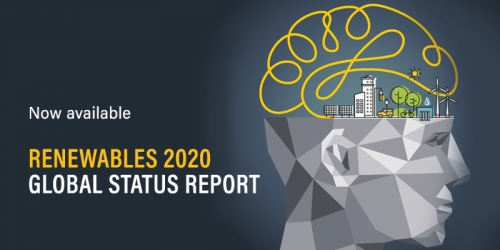Following the first World REnew Day in 2019, this year the pandemic made holding a follow-on event impossible.
But the organizers wanted to celebrate the day in a personal and intimate way. So we held a virtual meeting and flashmob, which we invite you to watch and enjoy.
So please, enjoy the video below, and celebrate the day with us, with a view to a sustainable future…
Growth in renewable power has been impressive over the past five years. But too little is happening in heating, cooling and transport. Overall, global hunger for energy keeps increasing and eats up progress, according to REN21’s Renewables 2020 Global Status Report (GSR2020), released today. The journey towards climate disaster continues unless we make an immediate switch to efficient and renewable energy in all sectors in the wake of the COVID-19 pandemic.
The report finds:
- Total final energy demand continues to be on the rise (1.4% annually from 2013 to 2018). Despite significant progress in renewable power generation, the share of renewables in total final energy demand barely increased (9.6% in 2013 to 11% in 2018). Compared to the power sector, the heating, cooling and transport sectors lag far behind (renewable energy share in power, 26%, heating and cooling, 10%, transport, 3%).
- Today’s progress is largely the result of policies and regulations initiated years ago and focus on the power sector. Major barriers seen in heating, cooling and transport are still almost the same a decade on. Policies are needed to create the right market conditions.
- The renewable energy sector employed around 11 million people worldwide in 2018
- In 2019, the private sector signed power purchase agreements (PPAs) for a record growth of over 43% from 2018 to 2019 in new renewable power capacity.
- The global climate strikes have reached unprecedented levels with millions of people across 150 countries. They have pushed governments to step up climate ambitions. As of April 2020, 1490 jurisdictions – spanning 29 countries and covering 822 million citizens – had issued “climate emergency” declarations, many of which include plans and targets for more renewable-based energy systems.
- While some countries are phasing out coal, others continued
to invest in new coal-fired power plants. In addition, funding from
private banks for fossil fuel projects has increased each year since
the signing of the Paris Agreement, totalling USD 2.7 trillion over
the last three years.
“It is clear, renewable power has become mainstream and that is great to see. But the progress in this one sector should not lead us to believe that renewables are a guaranteed success. Governments need to take action beyond economic recovery packages. They also need to create the rules and the environment to switch to an efficient and renewables-based energy system. Globally. Now.” concludes Arthouros Zervos, President of REN21.







